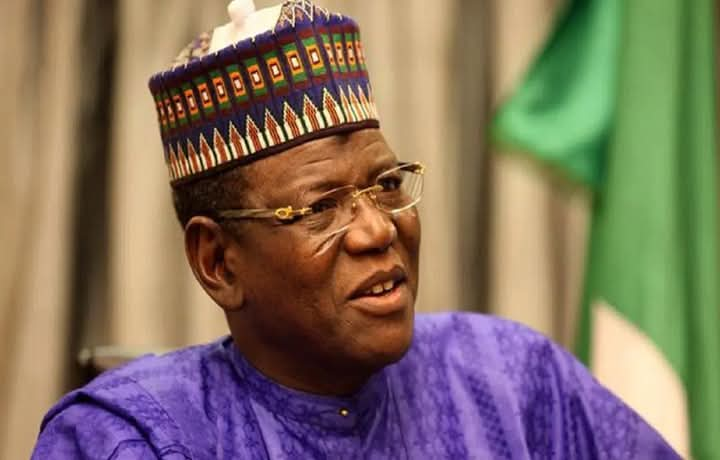Sule Lamido, former governor of Jigawa State, has revealed that he once directly urged former military president General Ibrahim Babangida (IBB) to step down from office following the controversial annulment of the June 12, 1993, presidential election won by Chief MKO Abiola.
Lamido, and one-time National Secretary of the now-defunct Social Democratic Party (SDP) made this disclosure in his autobiography, ‘Being True to Myself.’
The autobiography was launched on 13 May.
In Chapter Seven, titled “June 12 Consumes IBB,” he recounted how he received a sudden summons to meet the military ruler and how their conversation unfolded.
READ ALSO: Tinubu pledges continued military support as Nigeria inducts new combat helicopters
He recalled being contacted early one morning at his suite at the Nicon Noga Hilton (now Transcorp Hilton) by someone who introduced himself as Colonel Bamalli.
“The voice identified itself as Col. Bamalli and said that the C-in-C wants to see me now,” Lamido wrote.
“Being unfamiliar with the nomenclature, I asked, who is C-in-C? to which he replied, Mr President. I said, but I am just waking up, I haven’t even had my bath.”
Unbeknownst to him, Babangida was already on the call.
“I heard his voice, ‘Kai Sule, ka zo yanzu (Hey Sule, come over right now”). I said, Yes Sir!”
During their meeting at the Presidential Villa, Lamido said he found Babangida’s justification for voiding the election unconvincing.
The former head of state reportedly claimed that Abiola could not assume office due to outstanding debts the government owed him.

“As the national secretary of the SDP, I told him, No, the SDP is done with any discussion with the federal military government concerning the June 12 elections. We shall not participate in any new election, as far as we are concerned. It must be June 12 or nothing else.”
Lamido resisted Babangida’s proposed plans for a new transition, though he admitted that the actions of pro-democracy groups like NADECO later compelled the SDP to reconsider its position.
Reflecting on their tense exchange, Lamido said: “Then he asked me, ‘Sule, what do I do? In my naïve and innocent way, I told him frankly, sir, you must resign and leave office. Immediately I said that his countenance changed. I saw fire in his eyes; for some minutes, he was speechless.”
Babangida’s reaction was swift and intense.
“He looked at me straight and said, ‘Sule, no Nigerian can dare say that to me, and I know Nigerians very well. I never thought you could be that daring. You are very lucky. I see in you someone who is godly.”
“I know whatever you have been saying or doing was genuine and not induced. Whatever you say or do, right or wrong, is your personal understanding of issues. Even if it were madness, it is original, and a reflection of your true self.”
Lamido wrote that Babangida expressed regret at not having met him earlier, saying his previous perception of him had been wrong.
The autobiography further explores how negotiations between the two political parties—the SDP and the National Republican Convention (NRC)—and Babangida’s administration led to the emergence of Chief Ernest Shonekan as head of the Interim National Government (ING).
According to Lamido, the military sought a figure from the southwest who would appeal to the Yoruba people and also carry the confidence of the British government.
“Before Babangida could announce the formation of the Interim National Government, he must have felt that he needed to have a suitable person to head it from the Southwest, someone who could be accepted by the Yoruba, as a kind of consolation and a person that had good connections with the British government, which had been piling diplomatic pressure on the military government.
“As a former chairman of the United African Company, UAC, one of the oldest British companies in Nigeria and a very strong pillar in the country’s economy, Chief Ernest Shonekan fits the bill.”
Lamido said Shonekan was well-regarded in corporate and national circles, despite not being politically active during the 1993 elections.
“Mr Shonekan was well respected in the corporate world; he had the stature and national acceptance and was not controversial.”
He noted that some Yoruba elites tried to appropriate Abiola’s victory as a regional affair, despite their minimal participation in the process.
READ ALSO: Lamido urges Tinubu to compensate Abiola’s family over annulled 1993 election
“Although none of their prominent politicians had played any role in the elections, the Yoruba now wanted to hijack the victory of the SDP and its presidential candidate, Chief Abiola, and make it their own affair.
“The choice of Shonekan, a Yoruba, was to demonstrate that the annulment of the June 12 election was not because Abiola was a Yoruba.”
Lamido clarified that neither the SDP nor the NRC had any say in choosing Shonekan to lead the ING, countering popular narratives that the political class was complicit in the arrangement.


